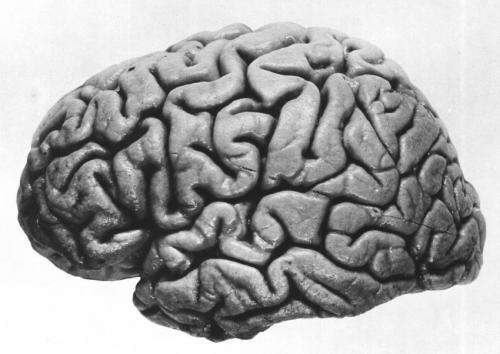Study finds repetitive brain injuries may accelerate aging, dementia risk

Repetitive head injuries that occur during contact sports and military service may accelerate the aging process by increasing the build-up of beta-amyloid in the brain, leading to worse disease and an increased likelihood of developing dementia. In particular, boxers fared the worst among athletes and military veterans with a history of head injuries.
These findings, which currently appear online in the journal Acta Neuropathologica, is the first to establish the age-dependent deposition of beta-amyloid in chronic traumatic encephalopathy (CTE), and may lead to the development of diagnostic tools and treatments for the long lasting effects of head trauma.
CTE is a neurodegenerative disease associated with repetitive mild traumatic brain injury. It is defined pathologically by the abnormal accumulation of tau in a unique pattern that is distinct from other tauopathies, including Alzheimer's disease. Although trauma has been suggested to increase amyloid β peptide (Aβ) levels, the extent of Aβ deposition in CTE has not been thoroughly characterized.
Researchers examined a large group of deceased athletes and military veterans with pathologically diagnosed CTE. They compared the number of individuals who developed clumps or deposits of beta-amyloid in the brain in this CTE group to a published group of normal individuals ages 1 to 100. They found that athletes and military veterans with CTE were four times more likely to develop beta-amyloid deposits in their brains and that in general this occurred 10-15 years earlier than in the normal aging group.
In addition, researchers looked within the group of athletes and compared those subjects with beta-amyloid to those without. They found individuals with beta-amyloid deposits had worse disease and a worse decline in their thinking ability. In addition, individuals with beta-amyloid were more likely to have Parkinson-like pathology and symptoms.
"This study suggests that treatment for some forms of CTE will likely require targeting beta-amyloid, suggesting that in some cases treatments being developed for Alzheimer's disease will also be helpful in CTE," explained corresponding author Thor Stein, MD, PhD, assistant professor of pathology and laboratory medicine at Boston University School of Medicine and associate director of the neuropathology core at the Boston University Alzheimer Disease Center and staff neuropathologist at Boston and Bedford VA Medical Centers. "It also provides further impetus for working to prevent concussions and sub-concussive hits in contact sports."


















